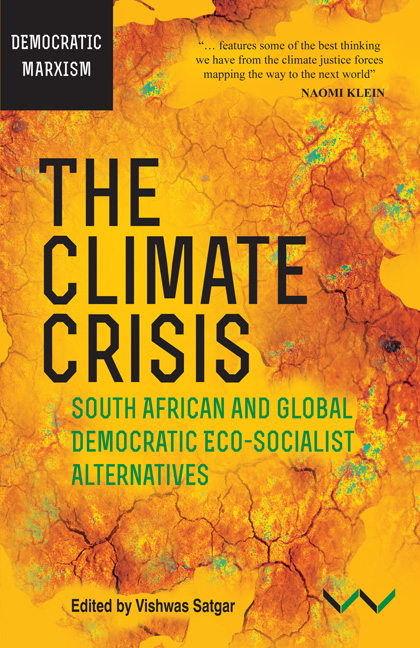Book contents
- Frontmatter
- Contents
- Tables and Box
- Acknowledgements
- Acronyms and Abbreviations
- Chapter 1 The Climate Crisis and Systemic Alternatives
- PART ONE THE CLIMATE CRISIS AS CAPITALIST CRISIS
- Chapter 2 The Limits of Capitalist Solutions to the Climate Crisis
- Chapter 3 The Anthropocene and Imperial Ecocide: Prospects for Just Transitions
- PART TWO DEMOCRATIC ECO-SOCIALIST ALTERNATIVES IN THE WORLD
- PART THREE DEMOCRATIC ECO-SOCIALIST ALTERNATIVES IN SOUTH AFRICA
- CONCLUSION
- Contributors
- Index
Chapter 3 - The Anthropocene and Imperial Ecocide: Prospects for Just Transitions
from PART ONE - THE CLIMATE CRISIS AS CAPITALIST CRISIS
Published online by Cambridge University Press: 05 June 2019
- Frontmatter
- Contents
- Tables and Box
- Acknowledgements
- Acronyms and Abbreviations
- Chapter 1 The Climate Crisis and Systemic Alternatives
- PART ONE THE CLIMATE CRISIS AS CAPITALIST CRISIS
- Chapter 2 The Limits of Capitalist Solutions to the Climate Crisis
- Chapter 3 The Anthropocene and Imperial Ecocide: Prospects for Just Transitions
- PART TWO DEMOCRATIC ECO-SOCIALIST ALTERNATIVES IN THE WORLD
- PART THREE DEMOCRATIC ECO-SOCIALIST ALTERNATIVES IN SOUTH AFRICA
- CONCLUSION
- Contributors
- Index
Summary
With about 200 000 years of modern human existence we are now a geological force shaping, determining and disrupting the Earth's biophysical system. The scientific Anthropocene discourse and research agenda confirms this. This is a fundamental and profound scientific insight, which cannot be ignored. It is most stark and dangerous in relation to the Earth's carbon cycle and human-generated carbon emissions. We are now heating the planet at levels that take us beyond the limited variability and stability we have experienced over the past 11 000 years in the geological period known as the Holocene.
At the same time, an official discourse around the Anthropocene has evolved, with both scientific and popular elements, within and around United Nations (UN)-led climate negotiations. Within the multilateral negotiations on the climate crisis, not only is the ideological discourse on the crisis grounded in green neoliberalism and techno-fixes, such as geo-engineering but, as importantly, it is also conjoined to the popular rendering of the notion of the Anthropocene as the ‘Human Age’. As a result, the Intergovernmental Panel on Climate Change (IPCC) in its fourth and more recent fifth report affirmed the notion of ‘human-induced climate change’. This has become part of global common sense and mainstream understandings of how we should think about the worsening climate crisis. This chapter seeks to show that this politically constructed discourse is not just part of a scientific and technocratic approach to managing a deeply flawed green neoliberal consensus within the UN-led Conference of the Parties (COP) negotiation process, but is actually an ideological discourse with serious consequences for how we understand the contemporary climate crisis. Simply put, the official Anthropocene-centred approach to the climate crisis suggests that it has to be explained as a human problem for which we are all equally responsible. This chapter engages critically with the ideological discourse and theory of the Anthropocene from a Marxist ecology perspective. Through this engagement, the chapter seeks to show the limits and ideological pitfalls of the official Anthropocene-centred understanding of the climate crisis. This is not, however, about rejecting the science of climate change or the scientific discourse on the Anthropocene as it relates to Earth's systems in general.
- Type
- Chapter
- Information
- Climate Crisis, TheSouth African and Global Democratic Eco-Socialist Alternatives, pp. 47 - 68Publisher: Wits University PressPrint publication year: 2018



